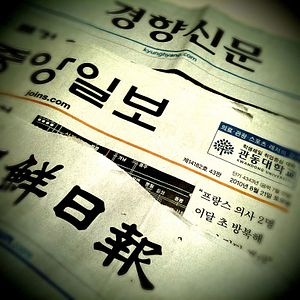A strict South Korean anti-corruption act years in the making kicked off Wednesday, and the corporate world, the local media and several industries are bracing for major changes.
The Improper Solicitation and Graft Act, dubbed the Kim Young-ran Act after the former chief of the Anti-Corruption and Civil Rights Commission, bars civil workers, journalists, and private schoolteachers — and their spouses — from receiving money and gifts respectively worth 30,000 won (roughly $30), 50,000 won, and 100,000 won. It applies to 4 million people directly, but its effects will spill over into economic losses of 11.6 trillion won ($10.6 billion) per year, according to the Korea Economic Research Institute.
Florists, farmers, restaurants, golf courses, and other gift-related and recreational industries are expecting huge hits when business favors become illegal, as treating business partners and journalists to lunch, dinner, drinks, fruit baskets, golf rounds, and even sexual entertainment at room salons is deeply rooted in corporate culture. The act also limits the practice of parents giving schoolteachers holiday and special gifts in hopes of increasing their children’s academic success.
The act shines a light on the long-held traditions of local media, whose beat reporters rely on the “chulib cheo,” elite clubs closely associated with corporate or government agencies, for scoops or special access to officials. The reporters, who wine and dine with executives and high-ranking officials, often write favorable articles for the agency or company or face possible expulsion from the circle if they write something defaming.
“People say the cheapest way to get an article is bribing reporters. … While I was a reporter [at a major Korean newspaper], I was given meals definitely worth $30 almost every time. Often dinner cost more than $100 with unlimited drinks and possible sexual entertainment,” says Lee Tae-hoon, a former reporter for the Korea Times daily who left in 2013 to found the online media outlet Korea Observer.
While admitting to be part of the culture of taking business-class flights and staying in classy hotels on another company’s dime in order “not to stand out,” Lee claims government agencies often gave him expensive holiday baskets that he would return — to the judgment of his peers.
He says peers also threatened him physically and verbally after he exposed a Joint Chiefs of Staff embezzlement case involving delivering money to journalists.
“You basically lose trust among your fellow reporters and sources because you stand out and people will try to negatively influence you,” Lee said.
The act was proposed in 2013 and took a backseat in parliament until the April 2014 Sewol ferry disaster exposed collusion between regulators and the shipping industry. It was revived and long debated before finally being passed in March 2015.
Critics are still wary over the vagueness of the law. For example, it sets price limits for work related gifts, but doesn’t specify what “work related” means. Critics also point out that while favors to journalists are banned, there may still be room to bribe the outlets themselves.
And while it may become harder for large companies to skirt the law, more will be required to reform the gift-giving and bribery mentality. Similar regulations to curb slush funds and entertainment spending have been evaded by splitting bills and other techniques.
Lee believes the culture and relationship between agencies and journalists will be hard to break, but the law marks an overall turn for the better.
“The biggest winners are the average public who wants to live a life without bribing others,” he says.

































